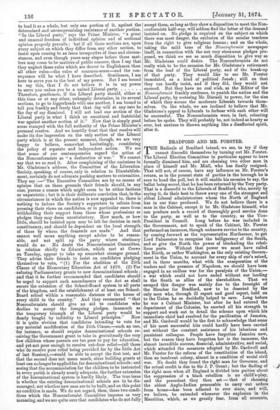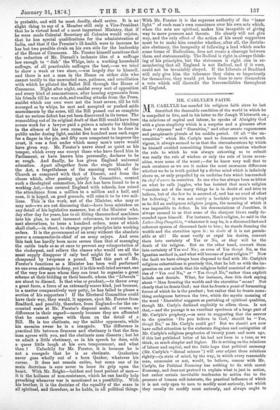BRADFORD AND MR. FORSTER.
President in Council. Long before he was included in the Government, not to speak of the Cabinet, Mr. Forster performed an immense, though unknown service to the country, by coming forward as the representative Northerner, to cret Lord Palmerston to recognise the belligerency of the South, and so give the North the power of blockading the rebel- lious ports. Without that power we must have called the North, or rather Washington, as the only existing Govern- ment in the Union, to account for every ship of our's seized, and in three months, what with the exasperation of the traders and the pressure of Napoleon, we should have been engaged in an endless war for the paralysis of the Union,— a war which could not have ended without our landing in the South as allies of the slaveholders. That we escaped this danger was mainly due to the foresight of the Member for Bradford, now to be deserted by the only men who, through ill report and good report, held on to the Union he so decidedly helped to save. Long before he was a Cabinet Minister, but after he had entered the department of the Colonies, he exerted all his strength to support and work out in detail the scheme upon which his immediate chief had resolved for the pacification of Jamaica, and Mr. Cardwell would be the first to acknowledge that some of his most successful hits could hardly have been carried out without the constant assistance of his laborious and persistent colleague. People have forgotten Jamaica now, but the reason they have forgotten her is the immense, the almost incredible success, financial, administrative, and social, which attended the measures adopted by Mr. Cardwell and Mr. Forster for the reform of the constitution of the island, then an insolvent colony, almost in a condition of social civil war. No doubt they found the right man for Governor, and the actual credit is due to Sir J. P. Grant ; but the finding of the right man when all England is divided into parties about the suppression of a black rebellion is no child's-play, and the precedent they then set — that of choosing the ablest Anglo-Indian procurable to carry out orders from home—has been adhered to ever since, and will, we believe, be extended whenever the explosion in the Mauritius, which, as we greatly fear, from all accounts,
is probable, and will be most deadly, shall arrive. It is no slight thing to say of a Member still only a Vice-President that he is virtual head of a most important Ministry, that if he were made Colonial Secretary all Colonies would rejoice, that he has special qualifications for the administration of India, and that if the Premier's ill health were to increase he has but two possible rivals on his own side for the leadership of the House of Commons. Mr. Forster himself mentions that the reduction of Mr. Disraeli's inchoate idea of a suffrage low enough to " dish" the Whigs, into a working household suffrage, of all practicable suffrages the best,—as we tried to show a week or two since, —was largely due to himself, and there is not a man in the House on either side who cannot testify to the unwearied care, patience, and conciliation with which he piloted the Ballot Bill through the House of Commons. Night after night, amidst every sort of opposition and every kind of remonstrance, after hearing arguments from his friends till he was sick, and reading attacks from the Press, amidst which our own were not the least severe, till he felt scourged as by whips, he met and accepted or pushed aside amendments by the score, till the Bill passed out so complete that no serious defect has yet been discovered in its terms. The remoulding out of its original draft of that Bill would have been severe work for a lawyer paid a guinea a minute for thinking in the silence of his own room, but as work to be clone in public under dazing light, amidst five hundred men each eager for a finger in the pie, and fifty men competent to improve the crust, it was a feat under which many men's nerve would have given way. Mr. Forster's nerve stood as quiet as his temper, which every one except those who have faced him in Parliament, or have known him personally, declares to be so rough. And finally, he has given England universal education. Apart altogether from the single blunder in the Act, a forgetfulness of the amazing wealth of the Church as compared with that of Dissent, and from the clause which, after passing quietly in Committee, created such a theological commotion, his Act has been found to be a working Act,—has covered England with schools, has raised the attendance from a million to a million and a half, and soon, it is hoped, on good grounds, will raise it to be two mil- lions. This is the work, not of the Minister, who may or may not—we are not discussing that—have been mistaken on any detail of his legislative measure, but of the Minister who, day after day for years, has to sit fitting thousands of machines into his plan, to meet incessant references, to restrain inces- sant aberrations, to issue a hundred orders, none of which shall clash,—in short, to change paper principles into working orders. It is the government of an army without the absolute power a commander-in-chief of an army enjoys. And even this task has hardly been more severe than that of managing the cattle trade so as at once to prevent any reimportation of the rinderpest, and relieve the classes who would see all the meat supply disappear if only beef might for a month be cheapened by twopence a pound. That this part of Mr. Forster's functions as a Minister has been well performed no one even attempts to deny, yet it is this well-tried servant, one of the very few men whom they can trust to organise a great scheme at their bidding or their benefit, whom the "Liberals " are about to discard. Is that wise or prudent,—to throw away a great force, a force of an extremely scarce kind, just because, in a matter comparatively very petty, he has failed to please a section of his supporters ? If the Electoral Committee could have their way, they would, it appears, eject Mr. Forster from Bradford, and possibly, therefore, from England—for the un- counted seats at Mr. Forster's disposal make, of course, no difference in their regard—merely because they are affronted that he cannot agree with them on the detail of a Bill. He is too obstinate, say the milder opponents, while his enemies swear he is a renegade. The difference in practical life between firmness and obstinacy is that the firm man agrees with you, and the obstinate man dissents ; but let us admit a little obstinacy, as in his speech he does, with a queer little laugh at his own temperament, and what then ? Unluckily for Mr. Forster, it is because he is not a renegade that he is so obstinate. Quakerism never goes wholly out of a born Quaker, whatever his career. It does not remain entire, but some one of its main doctrines is sure never to loose its grip upon the heart. With Mr. Bright—boldest and least patient of men— it is the holiness of non-resistance, which he can hardly help preaching whenever war is mentioned as a possibility. With his brother, it is the doctrine of the equality of the sexes in all spiritual, and therefore, as he holds, in all political things.
With Mr. Forster it is the supreme authority of the "inner light " of each man's own conscience over his own acts which, when the acts are spiritual, makes him incapable of giving way to mere pressure and threats. He clearly will not give way, and the only effect of the action of his usual supporters must be to make him consider whether, after all, the doctrin- aire obstinacy, the incapacity of following a lead which marks some forms of Radicalism, does not create a cleavage between them and statesmanship. The Radical is right in always think- ing of his principles, but the statesman is right also in re- membering that all England is not Radical, and if it were, could not be invariably obeyed. If the Liberals of Bradford will only give him- the tolerance they claim so imperiously for themselves, they would yet have time to save themselves a vote which will discredit the Irreconcilables throughout all England.



































 Previous page
Previous page